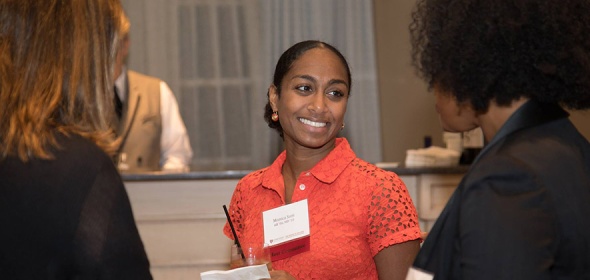“Structural racism.” “Institutional racism.” “Societal racism.” These are phrases that we commonly hear today that signal acknowledgement of the breadth and depth with which white supremacy maintains power in our lives.
These terms also enable some of us, as individuals, to maintain distance between ourselves and “it.” By talking about racism as something larger, all encompassing, and immutable, people can at the same time excuse ourselves from confronting the many ways we uphold and reinforce racism, according to Dr. Monica Soni, Senior Medical Director at New Century Health.
Soni is an alumna of the California Health Care Foundation’s Health Care Leadership Program, which is managed by Healthforce Center at UCSF. (The leadership program is accepting applications for its 21st cohort until June 16, 2021.) Since its inception, Healthforce Center has worked to combat racial health inequities, and we are actively supporting health care institutions to dismantle racism, improve health equity, and create anti-racist health organizations.
However, Soni points out that while professional anti-racism initiatives are important, we must be vigilant in our personal lives as well. She wants to empower people to think differently about individual choices -- both how they contribute to inequitable systems and how we can make conscious choices to do better. “It took hundreds of years to build up the institutions of racism that we live in every day, and it is going to take sustained persistence to break it down, so do what we tell our patients: Don't quit trying.”
At the April meeting of the Alumni Network for the CHCF Health Care Leadership Program, Soni shared examples -- and provided key data points -- of how our everyday decisions help to perpetuate structural racism, and how she herself works to identify opportunities to make social change. Soni encourages considering one’s action in these areas:
Public schools versus private schools. Where we choose to send our children to school is motivated by educational quality, safety, and competitiveness. Public schools in California are ranked around 38th in the nation, and the quality ranges widely within localities. As privileged parents elbow their way to the front for the best public schools, or abandon the public schools for private schools, they perpetuate white flight and reinforce structural racism locally. “This seemingly individual choice leads to segregation,” Soni summarized.
Self-interest is pervasive and goes unquestioned. Ibram X. Kendi, a historian and leading anti-racist scholar, notes, “My research kept pointing me to the same answer: The source of racist ideas was not ignorance and hate, but self-interest.” Soni agrees, re-phrasing civil rights leader Whitney Young Jr. this way: “Liberalism seems to be related to the distance people feel they are from the problem.” This framework forces us to look inward at the broader impact of the choices that we make within our own four walls.
Self-care is a radical action. When we are personally stressed out and have too much to manage, we are behaving in survival mode. This promotes a self-interested mindset, which is counter to staying conscious in ways that will neutralize privilege or promote equity. For example, when our fuel tank is low and we need to screen for a new hire, we are more likely to take mental shortcuts that rely on existing heuristics that do not counteract implicit biases. Soni says, “Self-care is radical because it is realizing that you have been weaponized. You are a part of the racist backbone of this country. And it’s going to take energy to fight the force that is racism.”
Soni acknowledges that maintaining a consistent effort in our daily lives to recognize and combat racism is hard work. Developing a skill set, being well resourced, and asking our personal networks to hold us accountable will help us do it.
“Be willing to take a risk. Don't shelter in place. Spend your hard-earned money differently. Allow a different voice to come to the table. Now is the time for all of us to be brave.”
For more examples, data, and discussion, watch Dr. Monica Soni’s talk on YouTube.
Learn more about the CHCF Health Care Leadership Program and apply by June 16.
Join Us
Sign up to learn about the latest health workforce research insights and leadership opportunities from Healthforce Center, an organization dedicated to helping health care organizations drive and navigate change.
